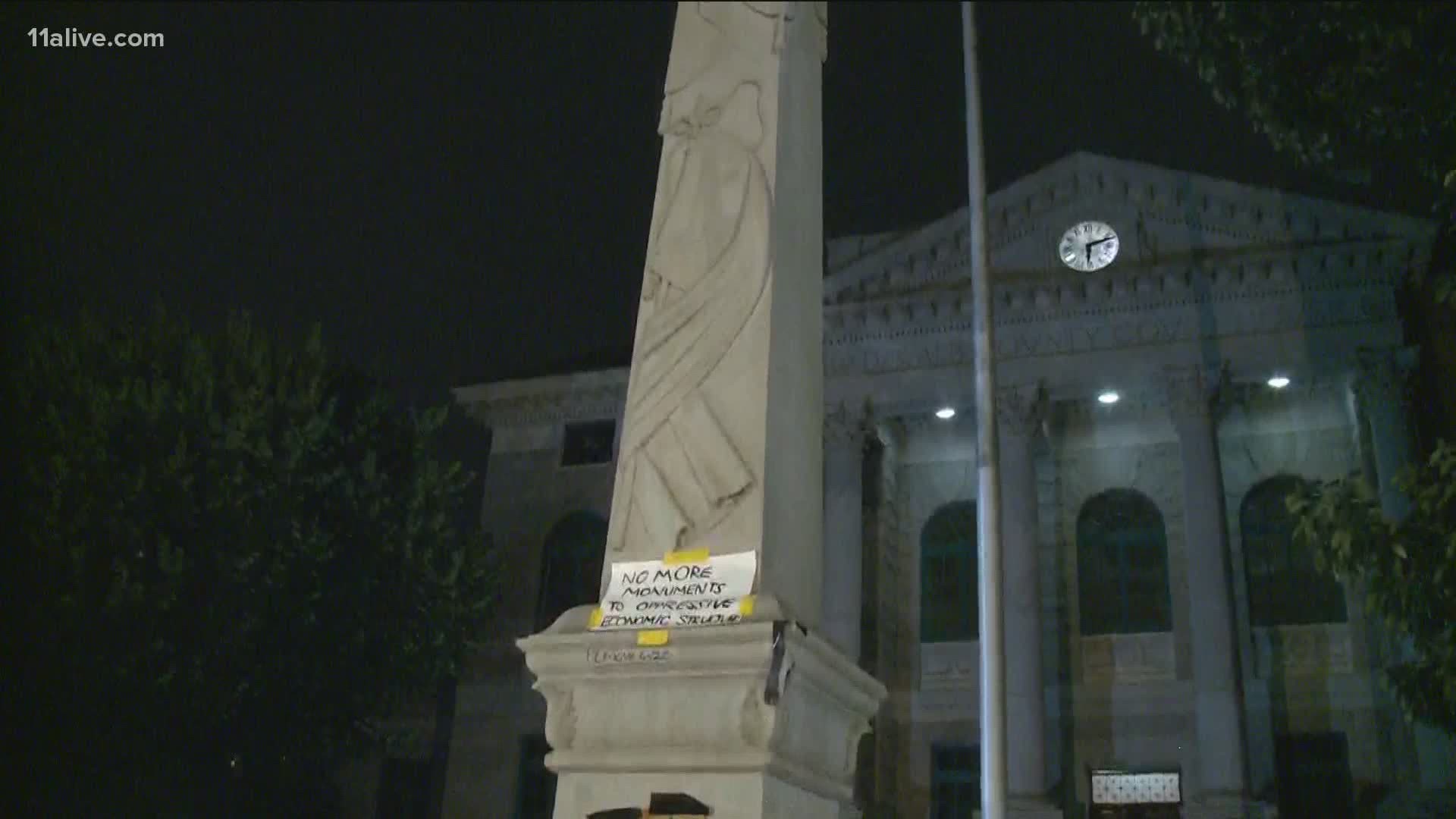DECATUR, Ga. — A judge has ruled in favor of a request by the City of Decatur's attorney to remove a Confederate obelisk, now dubbed a public nuisance, from county property due to ongoing vandalism.
Decatur City Attorney Bryan Downs filed a complaint to abate a public nuisance on Wednesday as well as an emergency motion for interlocutory abatement of a nuisance - or a request that the court takes action to solve the issue.
"In short, the Confederate obelisk has become an increasingly frequent target of graffiti and vandalism," the court response said in paraphrasing the filed complaint. "A figurative lightning rod for friction among citizens, and a potential catastrophe that could happen at any time if individuals attempt to forcibly remove or destroy it."
As such, Judge Clarence F. Seeliger of the Stone Mountain Judicial Circuit ordered on Friday that DeKalb County relocate the Obelisk to "a secure location for storage" until further word from the court.
"Though the Obelisk will be stored out of public view, abatement, as required by this Order, is not the purpose of preventing public display of the Obelisk, but instead is an appropriate measure to abate a public nuisance and protect the Obelisk," Judge Seeliger wrote.
The judge further orders the DeKalb County Sheriff's Office and the DeKalb County Police Department to "provide support" to Decatur Police as needed "to preserve public safety on the Decatur Square until the Obelisk is removed."
The decision to move the monument comes amid increased scrutiny regarding Confederate monuments - especially those on a government-owned property - across the United States.
Past actions in Decatur
The Obelisk itself has also been the subject of past demands for removal. However, a state law signed by Gov. Brian Kemp in 2019 requires that if a monument is moved it "must be relocated to a site of similar prominence, honor, visibility, and access within the same county or municipality."
This halted a move by the county commission last year, approved 6-1, to move the monument to a museum or possibly a local graveyard. The county allocated $3,000, instead, for a contextual sign to be placed alongside the statue until a suitable location could be found.
The push in Atlanta
Outside the state capitol on Friday evening, dozens of demonstrators gathered for their daily protest calling on the state to remove the statue of confederate war general John Gordon from the capitol grounds, along with other statues there that demonstrators say honor the state’s racist past.
On Thursday, a 55-year-old woman was arrested and led away slowly with her walker, accused of writing on the Gordon monument, in chalk, “Tear Down.”
“Tear it down!” said one protestor at the Capitol, Lauryn Johnson, on Friday. “Tear it down, replace it with anyone else who fought for black lives.”
Actions elsewhere in state, U.S.
In Rome, the city is trying to decide what to do about the statue of confederate general Nathan Bedford Forrest, who helped save Rome during key battles of the Civil War, and who then went on to create the Ku Klux Klan before renouncing it.
A public hearing on Friday drew passionate comments from both sides.
In Savannah, vandals defaced the statue of another Confederate general, Lafayette McLaws, that stands in one of the city’s parks.
In Richmond, Virginia, protestors tore down the statue of Jefferson Davis, the president of the confederacy.
In Norfolk, the mayor ordered the removal of “Johnny Reb,” which had been standing for 113 years.
History or celebration?
Martin O’Toole is with the Georgia division of the Sons of Confederate Veterans, and he sees the monuments as part of a historical record, not a celebration of the sins of the past.
“That’s simply part of American history,” O’Toole said Friday. “And what they want to do is expunge American history. ... They would expunge George Washington, the first president of the United States because he was a slaveholder. It just seems insane to hold everyone up to their rigid model of their personal perfection” applying current standards to people who lived in earlier centuries.
NBC News has begun compiling a map to show all the places where Confederate monuments are being removed or might be. They are mostly in the South. In all, there are nearly 1,800 Confederate symbols across the U.S.
“Those people were wrong and those people were hurtful,” said Ava Lindo outside the Georgia state capitol while protesting on Friday. “And they oppressed people like me for many years.”
“I definitely think that we don’t need a statue that symbolizes racism,” said another protestor, Aryn Bailey.
In session
The state legislature reconvenes on Monday. Demonstrators, who have been rallying every day outside the capitol, plan to go inside to try and speak directly with lawmakers, asking them to change the law and authorize the removal of all Confederate monuments and symbols.
MORE HEADLINES

